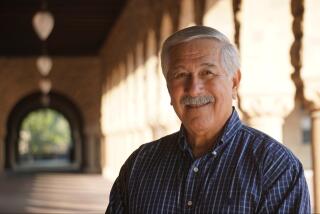Setting Priorities : Hard Work, Sacrifices Put Roosevelt High Scholar on Road to Harvard
- Share via
Alfred Fraijo is skipping physics class. Just the day before, on the phone, he had warned he could talk only during his half-hour lunch period. But when the period is over and the 1 p.m. bell sounds with a body-drumming intensity, Fraijo doesn’t even blink. He stays put for an interview in the quiet bungalow classroom on the edge of the Eastside sprawl that is Roosevelt High School.
“This is an interesting experience,” the 18-year-old senior offers graciously of his debut spin in the limelight, making one of his occasional slips into college-interview speak.
In Fraijo’s universe, skipping class is as foreign as going to class is for the woebegone, lost students in schools everywhere. The juxtaposition of a hardscrabble upbringing and a glossy academic record have made his life something of an urban fairy tale.
Ranked seventh out of 900 seniors at Roosevelt, Fraijo holds a dazzling 4.1 grade-point average, serves as student body president, sits on the youth advisory council for the Eastside’s City Council district and is a member of a community revitalization project called L.A. Neighborhood Initiative. Next fall, he is bound for Harvard University with a combination of scholarships, loans and job that will cover all costs from his plane fare to his tuition.
His day starts at 7:30 a.m. with a history class (in which he’s acting as judge for a mock trial) and includes American literature, economics, calculus, physics and Japanese. “I thought, I’ve already learned Spanish from my house,” explains Fraijo, who grew up in a bilingual family and is now taking his fourth year of Japanese.
His involvement in Japanese cultural activities even helped lead to his part-time job at the Downtown shop of a Japanese importer. He works seven-hour days on Saturday and Sunday.
For Fraijo, maintaining this body-and-soul-numbing schedule is about setting priorities. Sleep is not one of them.
“That’s a challenge,” he says ruefully, having slipped off the tie he had put on for a photographer. While his classmates chow down in the cafeteria on the other side of the school, he absent-mindedly nurses a carton of chocolate milk. Food is not a priority either.
“It’s really difficult on Sundays,” he sighs. “I don’t have a chance to unwind. I get home, eat and then do my homework.” Bed comes only in some hour past midnight, maybe 1 a.m. Then he’s up at 6:50 to do it all over again.
For Fraijo--the son of a Mexican-born woman who only finished sixth grade and a father who only finished ninth grade, the younger brother of two grown sisters who never finished high school--life and the future have always been about homework.
There is the occasional interview or awards lunch. Last Wednesday, he and two Roosevelt classmates, Noemi Altamirano and Jennifer Elizondo, were among 10 Los Angeles-area bilingual public school students honored at a lunch at a Westside hotel. All were given $5,000 grants through the MCI International Scholar Awards program.
But after the lunches and the meetings and the part-time jobs, after the after-school part of his life, there are the books:
“I need to do my homework; I need to be focused,” he says with determination. “If I have a fight with my parents, I don’t have space in my mind for that. Some people say, ‘If I get sleepy, I put work aside.’ ” He grins in amazement. “I cannot deal with that--prioritizing sleep over homework.”
Fraijo lives two blocks from school in a small house in Boyle Heights with his mother, Jessie Fraijo, and 7-year-old sister, Jerika Gutierrez. His father, who doesn’t live with the family, calls him every day and often picks him up from his weekend job. His stepfather, who also is not living with the family at the moment, supports them on his salary as manager of a restaurant.
Fraijo is mildly annoyed that his background is seen as a dramatic obstacle. “Some people paint minorities in this big challenge against society,” he says. “My family has been very supportive. I don’t live in a war-torn neighborhood. There are some gunshots at night. But you have to live there and go on.”
Drugs and gangs passed him by but violence has visited his street. “I had a guy dead on the sidewalk in front of our house,” he says. “That was an experience, but it wasn’t life-changing. It didn’t make me want to move.”
From the start, educators have placed him in programs for gifted students. And from the start, he has always been his own taskmaster, the sternest analyst of his own missteps. There is one he remembers from the sixth grade. “I can remember where I was sitting,” he says, musing over whether or not to reveal it.
“My teacher asked me a question--something about where a relative lived,” he recalls. “I said, ‘Oh, she lives long. ‘ And the teacher--she was really nice, she was really a good teacher--said, ‘You mean far away. ‘ “
The incident stuck him like a pinprick to the soul. “The teacher didn’t single me out. The students didn’t laugh,” he says. “But it was me. I was embarrassed. I said, ‘Alfred, you must overcome this and be the best you can be.’ ”
The rewards are obvious. The downside is, too. He doesn’t drive. No license. “I failed the written test,” he says with a sheepish grin. “Pretty embarrassing.” (Studying for the driver’s ed test got a zero priority in his life.)
He can’t tell you what kind of cars his friends drive. “I don’t know the particular models,” he says. “My friends are into the car radios or the motors they have. Talk to me about ‘The Grapes of Wrath’--or politics.”
Friends tease him about being distracted. “My friends tell me I space out,” he says, chuckling. “I don’t have a lot of close friends. I have people I can say hi to.” Later, evaluating how this sounds, he adds, “I have social skills. I definitely can get along with people.”
He’s not sure what he wants to be when he grows up. “First I was thinking about being a medical doctor--a general practitioner--or maybe an ambassador.”
One would assume he would mention politics.
“Right,” he agrees. “Maybe. I’m definitely interested in public service. I want to teach in a way that I can change people’s views.”
He seizes a thought.
“I want to be remembered,” he says without a trace of arrogance. He is all yearning. He smiles ruefully. “That sounds far-fetched. But being young, you can think about these things. You have to reach for the moon, you may land a star.”
Did he make that up or did he hear someone say that?
“Yes, someone said that,” he readily admits, pinpointing his inspiration as having come from a Roosevelt High alumni gathering.
He begins to shuffle some of his papers together, realizing he can still catch the tail end of his class. “I’ve got to go to physics,” he says apologetically. He chats a little bit longer then straps on a backpack.
So when will he learn to drive? “Maybe this summer,” he says as he walks to class. The summer that is already crowded with family wanting as much of him as they can have before he leaves for Cambridge, crowded with the demands of a job. He’ll be working for Rep. Xavier Becerra (D-Los Angeles) in his local office.
Fraijo stumbles over the spelling of his new boss’s name. “I’m a terrible speller,” he says.







